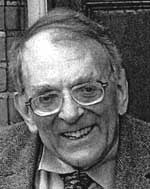 6th August: corrected the first quote: the first line should have read
6th August: corrected the first quote: the first line should have read
I had supposed that scholars were dedicated to the pursuit of truth, wherever that might lead, and that new ideas would always be welcome.
————————————–
Even some of the more conservative of New Testament scholars boast how they belong to a guild that prides itself on craving exploration for new insights, that is committed to testing the old ideas following wherever the truth may lead. Emeritus Professor Larry Hurtado about a year ago posted one such claim that as stridently endorsed by fellow faithful Christian soldiers/scholars James McGrath and Jim West:
The field of NT/Christian Origins, for example, is now more diverse, with more approaches, more perspectives, than ever; and probably most scholars dream of being able to correct or refute some established view, or successfully lodge some new view, or publish some hitherto unknown or insufficiently noted datum.
Innocent bystanders might raise an eyebrow at such claims emanating from a field that looks for all the world as if it is dominated by persons with a conflict of interest to such a pursuit. The vast majority are clearly committed in some fashion to the faith their scholarship seeks to underpin (or test).
I responded critically to the main theme of Larry’s disingenuously self-serving remarks because they sounded to me so contrary to what I have known researchers in “real” say about their fields. Do theologians really believe their own propaganda aimed at the masses of unwashed outsiders?
Fortunately not all do.
I have just had the pleasure of reading the memoirs of Michael Goulder, Five Stones and a Sling: Memoirs of a Biblical Scholar. Goulder is most noted for keeping the torch burning for the Austin Farrer thesis — the thesis that Luke knew and used Matthew and that there was no Q document behind either of these gospels — until Mark Goodacre came along to stand at his side and take up the cause.
There’s much in Goulder’s memoirs to write about but here let’s just see what this renowned scholar had to say about his own scholarly peers and their willingness to take up new ideas.
He explains the disappointment he experienced when scholars first dismissed his carefully reasoned arguments without any attempt to engage seriously with them:
I had supposed that scholars were dedicated to the pursuit of truth, wherever that might lead, and that new ideas would always be welcome. This, however, is only partly true. Before new ideas come, scholars have reached a consensus, and their position as authorities depends upon their agreeing with that consensus. Their teachers, whom they normally honoured, had taught them the consensus; they had written their books assuming it, and they had often helped to develop it themselves. They were not at all likely, therefore, to think that they and their fellow experts had been wrong, and that a new scholar, of whom they had not heard, was in a position to put them right.
But there is another problem: most scholars of the New Testament have religious loyalties: they want the text [Bible] to be orthodox, or historical, or preachable, or relevant. So any new interpretation which does not fulfil these conditions is not likely to be approved. (p. 28, my formatting and bolding)
So there you have it. That’s not Neil Godfrey or some unwashed amateur speaking. That’s a highly honoured scholar of the guild looking back on his career. (Goulder’s memoirs were published in the year before he sadly died at 82 years old.)
Goulder returned to this theme in the final chapter of his book:
Scholars who have assumed a position over many years do not quickly recant it and publicly admit their error; nor can a novel hypothesis expect to carry the day at once in a conservative profession. It may be particularly difficult to shift opinion over texts which are fundamental to the faith of the critic. (p. 134)
Why do scholars assume oral tradition behind the gospels? Why is Q so popular? Goulder suggests one reason that has more to do with faith than reason:
There is a hankering after putative lost sources and oral traditions which would take us back to the historical Jesus. (p. 134)
There are other factors, certainly. But let’s not let New Testament scholars try to kid anyone — including themselves — about that they do not belong to “an innately conservative” profession.
.
(I'm traveling with limited internet access so please advise Tim of any typos etc in the above. :-/ -- thanks)
If you enjoyed this post, please consider donating to Vridar. Thanks!

>That’s not **Blogger** Godfrey or some unwashed amateur speaking.
Fixed that for you 😉
Now if *only* the majority of New testament / Christian Origins Scholars were Jews…
I suspect we’d see a consensus that the New Testament was midrashed out of the Tanakh (LXX Version in Greek) and that the composers of the New Testament, plus the early church, seem to have conveniently “lost” the historical Jesus.
It’s pretty rare to see a Bible scholar criticize his profession in print. Gotta protect the brotherhood. Of course, Goulder was long retired when he wrote his memoirs, which were published right before his death.